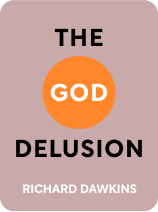

This article is an excerpt from the Shortform book guide to "The God Delusion" by Richard Dawkins. Shortform has the world's best summaries and analyses of books you should be reading.
Like this article? Sign up for a free trial here .
What is Richard Dawkins’ The God Delusion about? What are Dawkins’ views on religion?
In Richard Dawkins’ The God Delusion, he explains why God’s existence is unlikely and tackles several arguments about why religion is harmful. Dawkins claims religion is not only foolish but dangerous to society.
Read more about Richard Dawkins’ The God Delusion below.
Richard Dawkins: The God Delusion
In The God Delusion, University of Oxford biologist and anti-religion activist Richard Dawkins argues that religion has exerted a harmful influence on human society since its inception and that we ought to abandon it in favor of science. He illustrates this argument by demonstrating that:
- God almost certainly does not exist and the arguments for his existence are weak.
- Religion doesn’t exist because God granted us some divine wisdom—instead, it came about and persists through the mechanisms of evolutionary psychology and cultural transmission.
- We don’t need religion to behave morally.
- Religion actually promotes values that are distinctly immoral.
- Religion does not provide the emotional comfort and fulfillment its adherents claim.
Here’s more about Richard Dawkins’ The God Delusion and its’ hypotheses.
The God Hypothesis
The claim that God exists is a hypothesis, just like any other (we’ll call it the “God Hypothesis” in this summary). Since it is logically impossible to prove a negative, one can never be certain that God isn’t real. But that does not mean that we can’t reasonably assess the likelihood of the God Hypothesis.
Because, of course, we do not treat all hypotheses as being equally likely or plausible. The Tooth Fairy is also a hypothesis about how money appears under children’s pillows in the morning after they place a baby tooth under them at night. But because we have more rational and likely explanations for the appearance of the money under the pillow, we can confidently assign a very low probability to the Tooth Fairy Hypothesis.
In Richard Dawkins’ The God Delusion, The God Hypothesis is a perfectly legitimate one for science to study, evaluate, and, ultimately, reject, if the evidence in support of it is found to be lacking.
Richard Dawkins: The God Delusion and The Origins of Religion
Even though we’ve seen that the factual claims made by theism are highly unlikely to be true, we cannot ignore the fact that religion itself has existed and continues to exist, across all societies and all periods of time.
If we don’t accept the truth of religious claims, we have to account for religion’s existence by means of natural selection, evolutionary psychology, and cultural transmission, instead of divine received wisdom.
Belief in religion seems to be an extraordinarily disadvantageous trait that ought to have died out very early on in the evolution of humans. It compels individuals and societies to expend enormous resources on elaborate buildings, ritual sacrifices, and the maintenance of a priestly caste that does little to ensure the practical, day-to-day survival of either the individual or the group. How, then, did religion arise and evolve despite these drawbacks? Richard Dawkins’ The God Delusion attempts to answer it.
Religion and Morality
Aside from its likely falsehood, religion is also flawed because it’s not the source of human morality. To be sure, religious people certainly claim that Darwinism cannot account for the existence of altruism, kindness, or empathy. But, in fact, kindness and altruism have perfectly rational Darwinian roots.
The Role of Religion
What function is religion supposed to perform? Which needs does it purportedly fulfill? Proponents of religion claim that, at its best, religion provides human beings with:
- An explanation of the natural universe, its origins, and our role within it
- An exhortation to moral action
- Consolation in our moments of deepest loss and grief
As we’ve already discussed, the first two claims are patently false. Now, we’re going to explore why the final one is likewise invalid.

———End of Preview———
Like what you just read? Read the rest of the world's best book summary and analysis of Richard Dawkins's "The God Delusion" at Shortform .
Here's what you'll find in our full The God Delusion summary :
- Why Dawkins thinks religion has exerted a harmful influence on human society
- How Dawkins concludes that the existence of God is unlikely
- The 3 arguments that challenge the existence of God






